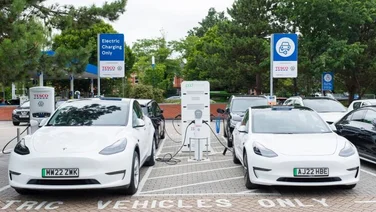- Nearly 8 billion tonnes of plastic has been discarded so far
- The Plastics Network is calling for a radical rethink of policies on plastic
- Informed, evidence-based policy recommendations have been published

The Plastics Network at the University of Birmingham has called on political parties to radically rethink their policies after just one manifesto mentioned the word ‘recycling’ and none of them included the word ‘plastic’ more than three times.
In response to the main political party manifestos, the group has launched its own set of evidence-based policy recommendations with industry experts ahead of the general election on 4 July.
It said that “given the potential risks to human, animal and environmental health, and the gaps in our understanding, it’s insufficient to merely manage plastic; we need to fundamentally rethink our relationship with it”.
The recommendations aim to “foster a sustainable future for plastics in the UK, amplifying the positive contributions that plastics make to our lives while minimising their negative impact throughout their lifecycle”.
As part of the report, the group put forth the following changes:
- Revalue plastic ‘waste’ to support green growth and stimulate the development of next-generation plastics production and recycling technologies.
- Advocate for best practices in public sector procurement, including protocols on plastics life cycle assessments
- Establish a national sustainable plastics innovation research centre to spur innovation and foster long-term, ambitious thinking
Baroness Molly Meacher, chair, the Birmingham Plastics Network Policy Commission, said: “The UK government is in a unique position to establish such a centre, bringing together diverse stakeholders and pooling skills and investment to foster collaboration across academic disciplines and industries.
The call comes as public concern around plastic waste continues to grow, as shown in its survey, made in collaboration with YouGov.
The survey revealed that more UK residents are concerned about the potential threats posed by plastic pollution than Covid-19, future pandemics, terrorism, economic collapse, natural disasters and artificial intelligence.
Meacher added: “The plastic-waste crisis has become a pivotal transitional issue. Despite the escalating amounts of plastic waste and pollution, plastic remains a vital material in society due to its versatility, durability, lightness and cost-effectiveness.
“It’s ubiquitous, from life-saving medical equipment to everyday conveniences, often contributing to improved sustainability outcomes.
“It’s crucial to recognise that sustainable plastics policies, rather than a complete shift away from plastics, are an essential part of the journey to net zero. This is particularly true in the UK, where plastic consumption contributes to significant carbon dioxide emissions due to reliance on landfilling and incineration.
“We urge the incoming UK government to consider our recommendations, and ultimately keep polymeric carbon in the economy for longer.”
More than 10 billion tonnes of plastic have been produced worldwide, with nearly 8 billion tonnes discarded so far, according to the University department.







